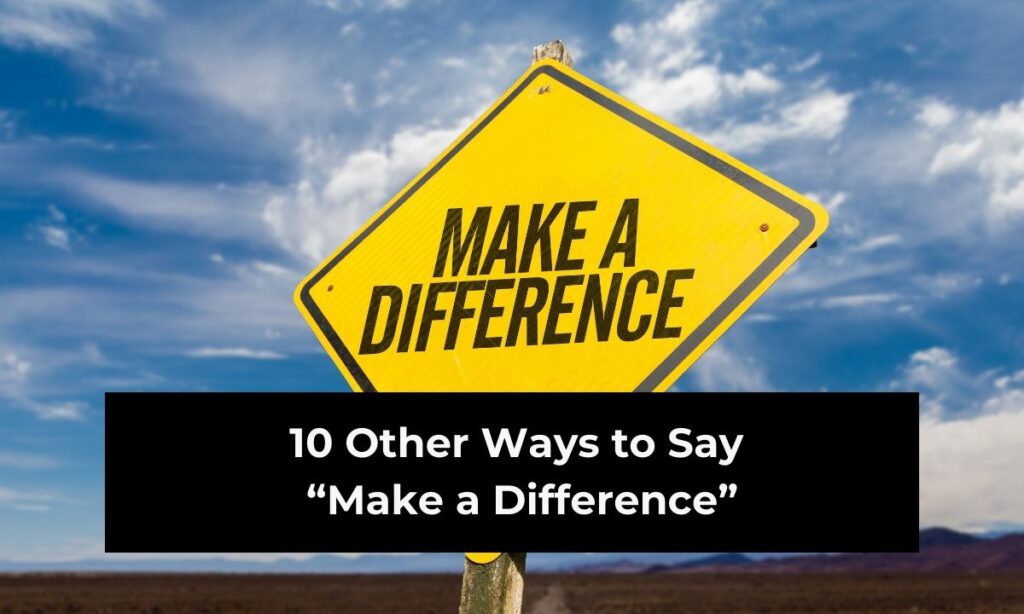When you hear the phrase “make a difference,” you probably think about creating positive change, leaving an impact, or doing something that truly matters. But sometimes, repeating the same phrase over and over can feel limiting—especially if you’re writing, speaking, or even journaling about your goals and contributions. That’s why having alternative expressions can be so powerful.
By expanding your vocabulary, you’re not just adding variety to your language—you’re giving yourself fresh ways to describe the meaningful things you do in your everyday life. Whether you’re encouraging someone in a motivational speech, writing a heartfelt message, or simply reflecting on the influence you’ve had on others, the words you choose can make your message stronger and more memorable.
The phrase “make a difference” is often connected with kindness, leadership, service, and personal growth. But what if you want to say it differently while keeping the same uplifting energy? That’s exactly what this article will help you do.

Below, you’ll discover 10 creative alternatives to “make a difference.” Each phrase comes with an explanation, real-life examples, and tips for when and how to use it. As you read through, you’ll notice that every alternative carries its own nuance—some focus on leaving a lasting impact, while others highlight inspiring change or uplifting someone’s life.
Must Read:
- Other Ways to Say “Happy to Announce”
- Other Ways to Say “Happy to Assist”
- Other Ways to Say “Let’s Do This”
By the end of this article, you’ll not only have a list of powerful new expressions to use but also a deeper understanding of how your words can inspire action, connection, and transformation. Let’s dive in and explore new ways to express the impact you create.
1. Create an Impact
When you say someone has “created an impact,” you highlight the strength and depth of their actions. This phrase is often used when someone’s contribution has led to noticeable, lasting changes—whether in a community, workplace, or even a personal relationship.
Think about the times when you’ve supported a cause, taught someone a valuable lesson, or even offered kindness that shifted someone’s day. In those moments, you’re not just helping—you’re shaping an outcome that people will remember. “Create an impact” works beautifully when you want to emphasize the tangible results of your effort.
You can use it in professional contexts, such as describing a leader who transformed a team’s culture, or in personal moments, like talking about a friend who inspires others with their generosity. The phrase captures the idea that what you’ve done is more than a quick gesture—it has staying power.
If you’re writing motivational content, this phrase can also resonate deeply. It reminds your audience that even small actions can ripple outward, touching lives in ways that go far beyond the moment. So, the next time you want to encourage someone, tell them: “Your actions can truly create an impact.”
2. Leave a Lasting Mark
“Leave a lasting mark” has a poetic quality, making it ideal for speeches, stories, or heartfelt writing. It suggests that what you’ve done will remain in people’s memories, shaping how they think, act, or feel in the future.
Imagine a teacher who inspires her students to dream big, or a volunteer who builds homes for families in need. Their influence doesn’t vanish once the lesson ends or the project is complete—it stays with people for years, perhaps even a lifetime. That’s the power of leaving a lasting mark.
This phrase works well in personal reflections too. If you’ve ever thought about what you want to be remembered for, you’ve already connected with this idea. Whether it’s through kindness, courage, or creativity, leaving a lasting mark means you’ve contributed something meaningful to the world.
It’s a wonderful alternative to “make a difference” because it captures not only the act of doing good but also the enduring impression it leaves behind. When you use it, you’re telling someone that their influence is unforgettable.
3. Inspire Change
Sometimes making a difference isn’t about direct action—it’s about sparking motivation in others. That’s where “inspire change” comes in. This phrase emphasizes the ability to encourage people to see new possibilities, challenge old ways, and take steps toward improvement.
Leaders, activists, and even everyday individuals can inspire change just by living authentically. For example, someone who shares their story of overcoming obstacles might motivate others to keep going during hard times. Or, a person who commits to sustainable living can inspire their community to care more about the environment.
“Inspire change” is particularly powerful because it focuses on influence. It recognizes that sometimes the greatest impact comes not from what you directly achieve, but from how you encourage others to act differently.
If you’re writing a motivational message or trying to uplift someone, telling them they have the power to “inspire change” reinforces the idea that their voice and actions matter. It’s a phrase filled with hope, vision, and encouragement.
4. Touch Lives
Few expressions are as heartfelt as “touch lives.” This phrase suggests a deep emotional connection—one that goes beyond practical outcomes and speaks directly to the heart. When you touch lives, you’re offering empathy, kindness, and care in a way that resonates personally with others.
Think about a nurse comforting patients, a mentor guiding someone through challenges, or even a friend listening when you need it most. These are all examples of touching lives, because they leave people feeling seen, valued, and cared for.
“Touch lives” is a great choice if you want to emphasize emotional impact rather than measurable results. It’s a reminder that small gestures—a smile, words of encouragement, acts of generosity—can hold profound meaning for someone else.
Using this phrase in your writing can make your message more personal and relatable. It helps you connect with readers or listeners by acknowledging the human side of making an impact. Sometimes, it’s not about changing the world in big ways, but about touching one life at a time.
5. Change the World
Bold and powerful, “change the world” is a phrase that inspires big dreams and limitless possibilities. While it may sound dramatic, it captures the essence of striving for transformation on a larger scale.
Activists, innovators, and leaders often use this expression to describe efforts that reach beyond individuals and communities, influencing society or even the globe. But don’t underestimate its everyday use—you don’t need to be famous to change the world. Even small contributions, multiplied over time, can create global ripple effects.
For instance, choosing to support ethical brands, reducing waste, or mentoring young people might not feel world-changing in the moment. Yet, collectively, such actions build toward meaningful progress. That’s the spirit behind the phrase.
When you use “change the world,” you’re tapping into an inspiring vision. It’s not just about what you do personally, but how your choices align with a bigger picture. It’s a call to action, urging you and others to think beyond today and imagine what’s possible.
6. Uplift Others
At its core, making a difference often means lifting people up. The phrase “uplift others” focuses on encouragement, support, and positivity. It’s about helping people rise above challenges, gain confidence, and feel capable of achieving more.
This could mean offering a kind word when someone feels down, celebrating their achievements, or creating opportunities for growth. In workplaces, uplifting others might look like recognizing your colleagues’ efforts. In personal life, it could mean being the friend who always sees the good in others.
“Uplift others” carries warmth and optimism. It reminds us that making a difference isn’t always about solving huge problems—it’s about the way you make people feel. Words of encouragement, acts of kindness, and a supportive attitude can all uplift others in ways that matter deeply.
This phrase is excellent for motivational writing, because it connects to the heart and inspires immediate action. After all, anyone can uplift someone else today with just a little effort.
7. Bring About Change
“Bring about change” is another strong alternative to “make a difference,” and it emphasizes being the driving force behind transformation. It suggests that your actions or ideas serve as a catalyst, moving things from one state to another.
Think of a community leader advocating for better schools, or an innovator creating new technology to solve everyday problems. These are examples of bringing about change—introducing something new that reshapes the future.
This phrase has a purposeful, action-oriented tone. It’s ideal for describing situations where someone isn’t just participating but actively pushing for improvement. It communicates effort, persistence, and results.
In everyday life, you might bring about change by helping a friend develop healthier habits, or by volunteering to make your neighborhood safer. It doesn’t always have to be massive—it’s about the shift you create, however big or small.
When you use “bring about change,” you’re emphasizing your role as a changemaker. It’s a phrase that captures determination and the belief that progress is possible.
8. Contribute Meaningfully
Sometimes making a difference is about knowing that what you’ve done has real value. That’s exactly what “contribute meaningfully” expresses. It shifts the focus from grand achievements to purposeful involvement.
For example, in a team project, contributing meaningfully might mean offering ideas that improve the outcome. In a community, it could mean volunteering time or resources that directly support others. The phrase underscores the importance of quality over quantity—what matters is that your efforts truly matter.
“Contribute meaningfully” is especially helpful in professional or academic settings. It communicates that your involvement isn’t just symbolic, but genuinely helpful. At the same time, it works beautifully in personal contexts, reminding you that meaningful contributions can happen anywhere.
By using this phrase, you acknowledge the importance of intention. It encourages people to think about not just what they do, but how and why they do it. That awareness itself can transform ordinary actions into extraordinary ones.
9. Make an Impact
“Make an impact” is one of the closest alternatives to “make a difference,” but it carries a slightly more modern, powerful tone. The word “impact” suggests influence that can be seen and felt, whether in measurable results or emotional resonance.
When someone makes an impact, their actions stand out. It could be an entrepreneur who launches a business that helps the community, or a volunteer who provides resources for those in need. It could also be as simple as a mentor helping a student find their path.
This phrase is versatile and can be used in personal, professional, and inspirational contexts. It’s especially popular in motivational content, because it conveys strength and positivity without being overused.
When you encourage someone to “make an impact,” you’re telling them their efforts matter. It’s a direct, compelling phrase that reminds people of their potential to create meaningful change.
10. Leave the World Better
“Leave the world better” is a beautiful and hopeful alternative. It’s often used to describe the idea that your presence, choices, and actions should leave things in a more positive state than you found them.
This phrase resonates strongly because it’s about legacy. Whether you’re caring for the environment, nurturing relationships, or helping your community, leaving the world better is about living intentionally and thinking long-term.
It can be applied to small acts, like planting a tree or helping a neighbor, as well as big achievements, like creating programs that support future generations. What matters most is the mindset—focusing on what you can do today that contributes to a brighter tomorrow.
“Leave the world better” is ideal for reflective writing and inspiring others. It invites people to think about their purpose and encourages a sense of responsibility for the future. At its heart, it’s a phrase about kindness, stewardship, and hope.
Conclusion
Finding new ways to express the idea of “making a difference” isn’t just about avoiding repetition—it’s about unlocking the power of language to inspire, encourage, and connect. Each alternative we explored—whether it’s “create an impact,” “touch lives,” or “leave the world better”—offers its own shade of meaning.
By using these phrases, you expand the way you describe meaningful actions. You also remind yourself and others that making an impact doesn’t always mean solving huge global problems. Sometimes it’s about uplifting a single person, contributing meaningfully to your community, or leaving a lasting mark on those around you.
The words you choose shape how your message is received. And when you choose powerful, varied expressions, you reinforce the idea that everyone has the ability to inspire change. Whether in small acts of kindness or larger commitments, your efforts matter more than you realize.
So the next time you want to talk about making a difference, reach for one of these alternatives. Use them to encourage yourself, motivate others, and highlight the extraordinary ways people leave the world better than they found it.
FAQs
1. What does “make a difference” really mean?
It means creating a positive effect, no matter how big or small. It could be helping someone personally, improving a situation, or inspiring change in a larger community.
2. Are these alternatives formal or informal?
Most of them work in both contexts. Phrases like “contribute meaningfully” and “create an impact” are excellent for professional settings, while “touch lives” and “uplift others” feel more personal.
3. Can small actions still make a difference?
Absolutely. Even the smallest gestures, like kindness or encouragement, can leave a lasting impression and create ripple effects that influence others.
4. Which phrase is best for motivational writing?
“Inspire change” and “leave the world better” are especially uplifting and motivational, making them great for speeches, articles, and inspirational messages.
5. How can I start making a difference in daily life?
Begin with small, intentional actions—show kindness, volunteer, mentor others, or practice sustainability. Every effort, no matter how small, has the power to create change.





